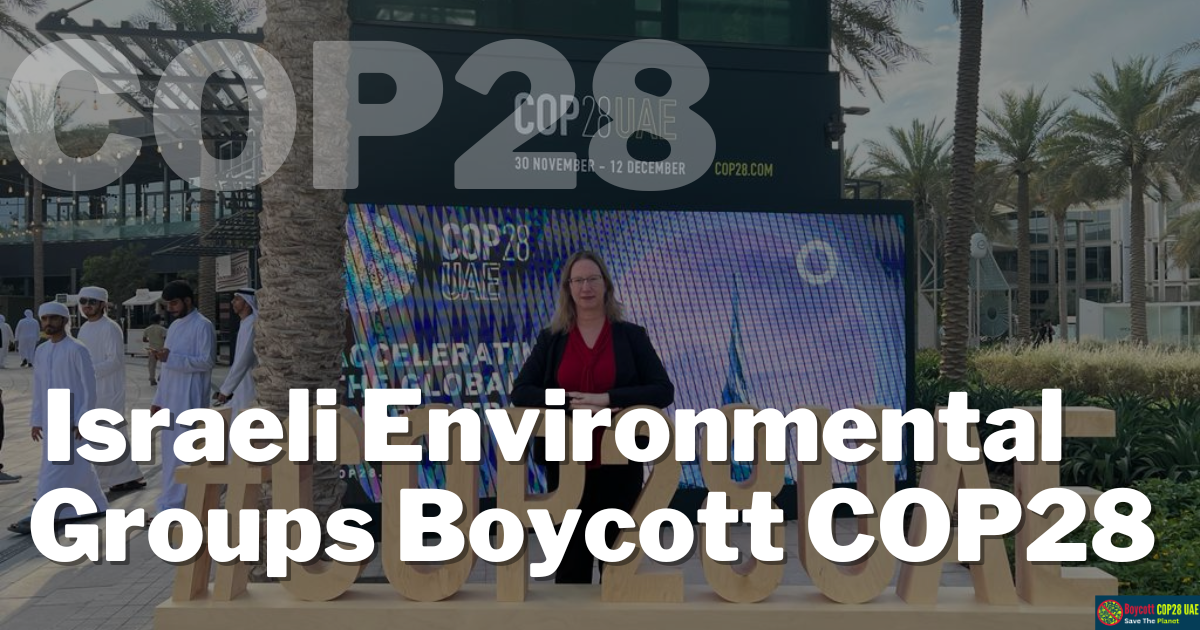In a significant move, several major Israeli environmental organizations have decided to stand in solidarity with their international peers and boycott the annual conference, COP28. This meeting is scheduled to be held in Dubai at the end of this year.
Their decision arises from concerns over the Israeli government’s lack of progress in decreasing emissions and the choice of the United Arab Emirates (UAE), an oil-producing nation, to host the conference. Adding to their discontent is the appointment of Sultan Al-Jaber, head of Abu Dhabi’s oil industry, as the conference’s chairman, which they view as a disregard for the worldwide environmental crisis.
UAE’s Choice And Environmental Concerns
The selection of the UAE, a nation heavily reliant on oil production, to host COP28 has sparked outrage among Israeli environmental advocates. They argue that holding a climate conference in a country with significant fossil fuel interests sends conflicting messages about the seriousness of addressing climate change. Oil-producing nations may be motivated to prioritize their economic interests over climate action, potentially undermining the conference’s ability to achieve substantial progress.
Challenging The Leadership Appointment
The appointment of Sultan Al-Jaber, a prominent figure in the UAE’s oil industry, as the chairman of COP28 has been met with strong opposition from environmental groups. They perceive this appointment as a “mockery” of the global effort to combat climate change and a disregard for the urgent need to transition away from fossil fuels. Critics argue that having an oil executive lead a climate conference raises questions about the sincerity of the host country’s commitment to sustainability and mitigating greenhouse gas emissions.
Protesting Israel’s Climate Inaction
The Israeli environmental organizations are not only voicing their disapproval of the UAE’s hosting and leadership appointment but also raising concerns about their own government’s lack of action on climate change.
They claim that successive Israeli administrations have unsuccessful to enact ambitious climate laws and have done very little to reduce greenhouse gas emissions.
One of the chief concerns is the absence of adequate funding and support for renewable energy sources. These sources, such as solar power, have the potential to significantly reduce carbon emissions and combat climate change effectively. However, Israel’s efforts to promote and incentivize renewable energy development have been lackluster, hindering the country’s transition to a more sustainable energy landscape.
Additionally, the lack of progress in expanding the electricity grid to accommodate increased renewable energy production is seen as a significant setback. A well-developed electricity grid is essential for integrating renewable energy sources into the national energy mix seamlessly. The absence of such infrastructure further reinforces the perception that Israel is falling behind in its commitment to reducing its carbon footprint.
Conclusion
The decision of several Israeli environmental organizations to boycott COP28 in Dubai reflects their discontent with the UAE’s choice as host and the appointment of an oil industry head as chairman. It also underscores their frustration with the Israeli government’s perceived lack of commitment to addressing climate change.
Climate action requires international cooperation and concerted efforts from all nations, irrespective of their economic interests. By boycotting the conference, these organizations aim to draw attention to the urgency of the climate crisis and the need for comprehensive and meaningful actions to mitigate its impact.
Environmental challenges know no borders, and tackling climate change demands collaborative solutions. Rather than isolating nations or disregarding the concerns of environmental advocates, it is essential for countries to come together and work towards a sustainable and greener future for the planet.






